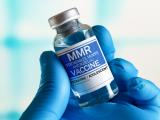Mar 20, 2013 (CIDRAP News) – Immunization systems in Africa still have supply, financing, and sustainability issues and need urgent attention from country leaders to reach the region's health goals, African experts said yesterday.
Three vaccine and infectious disease experts from the University of Cape Town in South Africa raised their concerns in a policy forum in Public Library of Science (PLoS) Medicine. Though they commended African countries for their progress with immunization systems, they said that outbreaks of diseases such as polio and measles as well as high vaccine dropout rates point to failures within the system.
They noted that wide intra- and inter-country differences mean vaccines aren't reaching large numbers of African children and others are receiving suboptimal doses.
Most African countries face challenges with cold-chain management and a lack of trained staff to administer the vaccines, and in 2010 one fifth of African countries had yet to adopt the use of auto-disable syringes and other safety measures, the group wrote.
Increased spending on immunization has come mainly from donor funds, and although some African countries have set line items for vaccination in their national budgets, more than a third of them went unfunded.
Only 8 of Africa's 53 governments funded routine vaccines, the authors noted.
African countries have made headway against disease such as polio, measles, yellow fever, and neonatal tetanus, but Nigeria remains one of the world's polio endemic countries. In addition, 27 countries had measles outbreaks from 2009 through 2011 due to low vaccine coverage and gaps in follow-up immunization.
Progress with introducing new or underused vaccines in Africa has been slow, the experts wrote. So far only seven countries have introduced the rotavirus and/or pneumococcal conjugate vaccines, which are often costly and unaffordable for most. Additional countries are expected to introduce the vaccines this year with global health funding.
A bright spot is a new vaccine that was developed for Africa against meningococcal group A, they pointed out. Within 2 years of licensure, 6 of 25 countries have introduced the vaccine with support from the international community.
With a 2015 deadline approaching for Africa's millennium development goals, leaders need to assess their situations, take ownership of regional and country problems, and develop plans to overcome the challenges, they wrote.
In other vaccine developments, 14 countries in the World Health Organization (WHO) Western Pacific Region recently launched an alliance to develop and strengthen vaccine regulatory authority, the WHO said today in a press release.
Regional director Dr Shin Young-soo said in the statement, "The regional alliance for national regulatory authorities will help fill the need for independent, competent, and effective regulatory systems to oversee the supply of assured-quality vaccines."
The alliance is expected to support the convergence of regulatory standards, enhance the exchange of regulatory information, and promote collaboration in the Western Pacific, according to the WHO. The alliance launched on Mar 14 on the last day of a 3-day workshop on regulatory issues.
See also:
Mar 19 PLoS Medicine report
Mar 19 PLoS press release
Mar 20 WHO Western Pacific Region press release



















